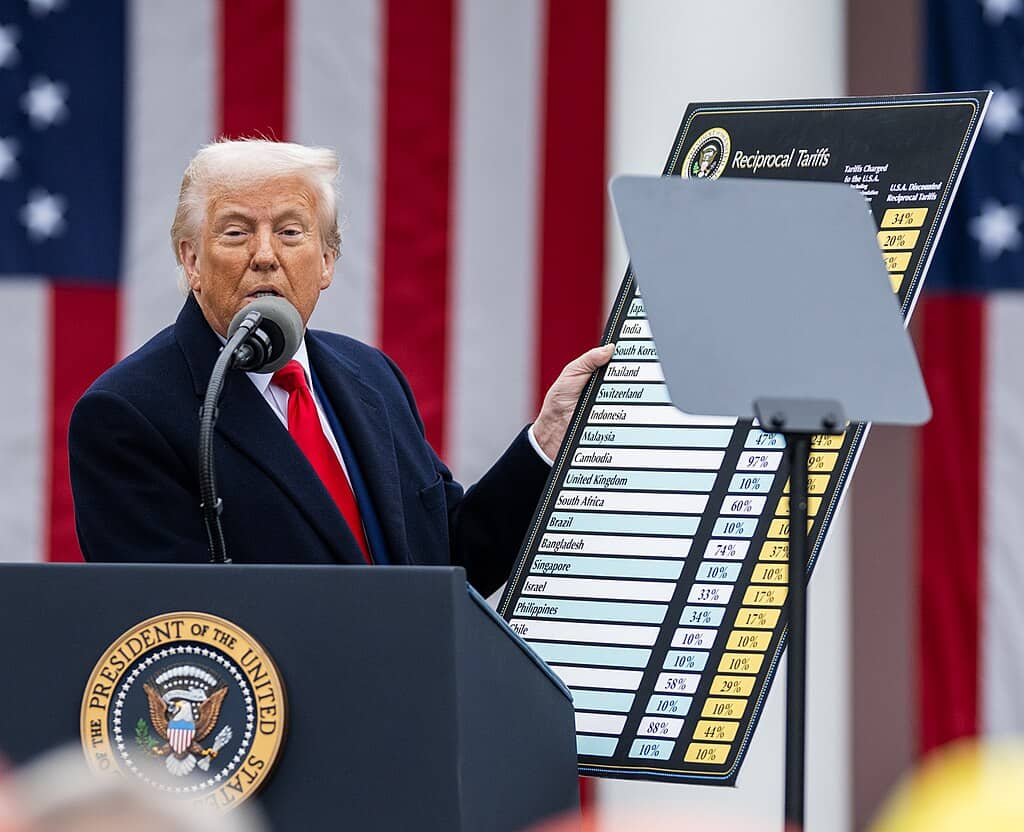Trump has been promising to impose tariffs on the European Union for a few months now, and yesterday, those promises became a reality.
How will that affect the Dutch economy? We’re breaking it down for you.
“Liberation day”
Yesterday (April 2), Trump imposed what he calls “reciprocal tariffs” on the EU, which means there will now be a 20% import duty on all European products, reports NU.nl.
The term reciprocal comes from the fact that Trump claims the tariffs are only half of what European countries charge American products.
In his usual dramatic fashion, he called April 2 “Liberation Day” and the start of a new American “Golden Age” since his tariff policy will supposedly encourage American consumers to buy domestically and attract businesses to the US.
Will the Netherlands take a hit?
While the tariffs aren’t exactly exciting news for any European country, there’s no need to worry about the Dutch economy too much. That being said, there are some negatives.
Firstly, about 5% of the €40 billion worth of Dutch exports goes to the US, so Americans buying fewer Dutch products could slow down economic growth.
Moreover, if the tariffs harm the world economy as a whole, the Netherlands and all its trade suffer with it.
De hogere VS-tarieven zijn slecht nieuws voor Nederland én de VS. Ik betreur ze ten zeerste. Nederland wil altijd samenwerken met de VS, maar als gelijkwaardige partners. De EU komt met een gepaste reactie als het niet lukt om via de dialoog de VS-tarieven van tafel te krijgen.— Reinette Klever (@ministerBHO) April 3, 2025
Translation: The higher US tariffs are bad news for the Netherlands and the US. I deeply regret them. The Netherlands will always want to work with the US, but as equal partners. If the tariffs aren’t taken off the table through dialogue, the EU will employ appropriate measures.
But lucky for us, the Netherlands has been practicing Trump’s dream of domestic consumption for a while.
As a result, it depends on this domestic consumption, along with trade between neighbouring countries, more than it depends on US trade.
And while 5% isn’t negligible, the Dutch still do most of their trading with these neighbouring countries, such as Belgium and Germany.
A Rabobank prediction from March claims that tariffs could limit Dutch economic growth to 1.5% at most — as opposed to the 1.7% it would have been otherwise.
Nothing golden about this age
Despite the grandiose language Trump likes to use to describe his economic policy, it’s the US that will likely take a larger blow.
Practically, the tariffs will manifest as a tax that American consumers and companies will have to pay.
This is especially true for products that don’t have a lot of domestic alternatives, which could fuel inflation in the country — and we know the US doesn’t need more of that at the moment.
Finally, much like here, an uncertain world economy isn’t good news for the US either. Companies are more careful with their investments, and consumer confidence is declining.
As Trump announced in yesterday’s speech, April 2 might in fact be one of the most important days in American history — but for all the wrong reasons.
Oh my god. At the exact moment Trump announced his tariffs the market crashed in real time.
CNBC is SAVAGE for doing the side by side.
pic.twitter.com/7zChENvtY9— CALL TO ACTIVISM (@CalltoActivism) April 2, 2025
Dig what you’re reading? Get more of it! Join our WhatsApp channel or Instagram broadcast to get the latest news straight to your pocket. ⚡️
Feature image: The White House/Wikimedia Commons/Public Domain



